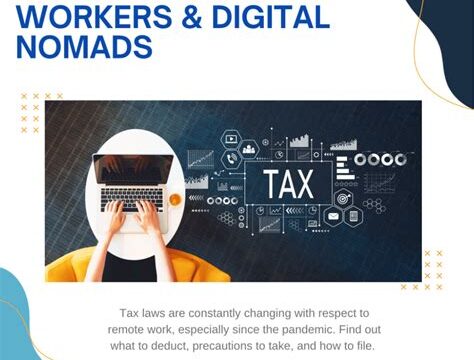Understanding Tax Residency
Tax residency is a crucial concept in the world of taxation. It determines the jurisdiction or country in which an individual or a company is liable to pay taxes. It is essential to understand tax residency because it impacts the tax obligations and liabilities of individuals and businesses. In this blog post, we will delve deeper into the concept of tax residency and explore its significance in the realm of taxation.
First and foremost, it is important to understand what tax residency means. Tax residency refers to the status of an individual or a company in being a resident for tax purposes in a particular country. It is typically based on the amount of time an individual or a company spends in a country, as well as other factors such as their permanent home or place of business. The determination of tax residency is crucial because it affects which country can tax the individual or company’s income.
Understanding tax residency is essential because it helps individuals and businesses determine their tax obligations in different countries. Different countries have different rules and regulations regarding tax residency, and it is necessary to be aware of these rules to ensure compliance and avoid any legal issues. Failure to understand and comply with tax residency rules can lead to penalties, fines, or even legal consequences.
In order to determine tax residency, various factors are taken into consideration. These factors may include the length of stay in a country, the individual’s permanent home, the individual’s center of vital interests, and the individual’s habitual abode. It is crucial to carefully evaluate these factors to ascertain which country an individual or a company is considered a tax resident.
- Length of stay: The amount of time an individual spends in a country is an important determinant of tax residency. In many countries, if an individual stays for a certain number of days or months in a calendar year, they may be considered tax residents.
- Permanent home: The concept of a permanent home refers to the individual’s country of permanent residence. This is usually the country where the individual has a fixed abode, such as a house or an apartment.
- Center of vital interests: The center of vital interests refers to the country where an individual conducts their personal and economic activities. This includes factors such as employment, business interests, family, and social ties.
- Habitual abode: The habitual abode refers to the country where an individual spends the majority of their time. This is determined by evaluating where the individual has the strongest personal and social connections.
| Factors | Definition |
|---|---|
| Length of stay | The amount of time an individual spends in a country. |
| Permanent home | The individual’s country of permanent residence. |
| Center of vital interests | The country where an individual conducts their personal and economic activities. |
| Habitual abode | The country where an individual spends the majority of their time. |
Understanding tax residency is crucial for individuals and businesses alike. It helps determine the tax obligations and liabilities of individuals and companies, ensuring compliance with tax laws and regulations. By understanding the factors that determine tax residency, individuals and businesses can make informed decisions and effectively manage their tax obligations in different countries.
Determining Tax Obligations in Home Country
When it comes to taxes, understanding your obligations in your home country is essential. Whether you are a salaried employee, a freelancer, or a business owner, knowing how much tax you are required to pay and what your responsibilities are is crucial to avoiding penalties and ensuring compliance. In this blog post, we will explore the various factors involved in determining tax obligations in your home country.
1. Residential status: The first step in determining your tax obligations is to establish your residential status. This typically depends on the number of days you spend in your home country during a tax year. Different countries have different rules regarding residency, so it is important to familiarize yourself with the specific guidelines applicable to you.
2. Types of income: The next factor to consider is the type of income you earn. Whether it is from employment, self-employment, investments, or rental properties, each category may have different tax implications. Some income may be exempt from taxation, while others may be subject to specific tax rates or additional reporting requirements.
3. Tax deductions and credits: Taking advantage of available tax deductions and credits can significantly reduce your tax liability. Common deductions include expenses related to education, healthcare, mortgage interest, and charitable contributions. Additionally, some countries offer tax credits for specific activities, such as adopting a child or investing in renewable energy.
4. Reporting and filing requirements: Understanding the specific reporting and filing requirements in your home country is essential to ensure compliance. This includes knowing the deadlines for submitting tax returns, making estimated tax payments, and maintaining accurate records of income and expenses. Failure to meet these requirements can result in penalties and additional scrutiny from tax authorities.
In summary, determining your tax obligations in your home country involves considering your residential status, the types of income you earn, available deductions and credits, as well as the reporting and filing requirements. It is important to stay informed about any changes or updates to tax laws and seek professional advice if needed. By understanding and fulfilling your tax obligations, you can avoid unnecessary penalties and ensure a smooth tax filing process.
Exploring Tax-Friendly Countries for Digital Nomads
When it comes to being a digital nomad, one of the biggest benefits is the ability to work from anywhere in the world. However, this freedom comes with certain responsibilities, including understanding and managing your tax obligations. Fortunately, there are several tax-friendly countries that can be an ideal fit for digital nomads. These countries offer favorable tax regulations, low or no income tax rates, and other incentives that make them attractive destinations for those who choose the nomadic lifestyle.
One of the popular tax-friendly countries for digital nomads is Portugal. Portugal offers a special tax regime known as the Non-Habitual Resident (NHR) program, which allows eligible individuals to benefit from a flat income tax rate of 20% for certain types of foreign income. This program is valid for ten years, making it an attractive option for digital nomads who plan to reside in Portugal for an extended period. Additionally, Portugal does not tax income earned from abroad, making it a favorable destination for remote workers.
Another tax-friendly country for digital nomads is Estonia. Estonia operates on a unique tax system known as e-Residency, which allows individuals to establish and manage their businesses online. This system provides digital nomads with the opportunity to run their own companies from anywhere in the world while benefiting from Estonia’s low corporate tax rate of 20%. The e-Residency program also offers easy access to various financial services and simplifies the tax-filing process for entrepreneurs.
| Country | Tax Benefits |
|---|---|
| Portugal | – Non-Habitual Resident program |
| Estonia | – e-Residency program |
| Thailand | – Territorial tax system |
Thailand is another tax-friendly country that attracts digital nomads. Thailand follows a territorial tax system, which means that individuals are only taxed on income earned within the country. This makes it an appealing option for those who derive their income from online sources and can work from anywhere. Moreover, Thailand offers a low cost of living, beautiful landscapes, and a vibrant expat community, making it a popular choice for digital nomads seeking a favorable tax environment.
Exploring tax-friendly countries for digital nomads is essential for ensuring financial stability and optimizing tax obligations. While Portugal, Estonia, and Thailand are just a few examples, there are numerous other countries around the world that offer favorable tax conditions for individuals leading a nomadic lifestyle. It is important for digital nomads to thoroughly research each country’s tax policies, consult with tax professionals, and make informed decisions based on their individual circumstances and goals.
Implementing Legal Structures for Tax Optimization
When it comes to managing our taxes, it’s essential to explore strategies and structures that can optimize our financial situation. One effective approach is implementing legal structures for tax optimization. These structures are designed to legally reduce tax liabilities and maximize exemptions and deductions available to individuals and businesses.
One popular legal structure for tax optimization is setting up a business entity such as a corporation or a limited liability company (LLC). By establishing a separate legal entity, individuals can take advantage of various tax benefits and deductions that are not available to sole proprietors or individuals. For example, corporations may qualify for lower tax rates, deduct business expenses, and enjoy liability protection. Similarly, an LLC can provide flexible tax treatment, as it can be treated as a pass-through entity for tax purposes.
Another effective strategy for tax optimization is creating offshore entities or utilizing tax-friendly jurisdictions. Offshore companies offer attractive tax benefits, such as zero or low corporate taxes, exemption from capital gains taxes, and confidentiality. By establishing an offshore entity, businesses and individuals can legally reduce their tax liabilities, protect their assets, and achieve greater financial privacy. However, it’s important to note that proper compliance with tax regulations and reporting requirements is crucial to avoid legal issues.
- Maximizing deductions: One of the key advantages of implementing legal structures for tax optimization is the ability to maximize deductions. Individuals and businesses can deduct various expenses, such as business-related expenses, healthcare costs, mortgage interest, and charitable donations. By carefully tracking and documenting these expenses, taxpayers can minimize their taxable income and reduce their overall tax obligations.
- Utilizing exemptions: Along with deductions, exemptions can also help in optimizing taxes. Exemptions are specific amounts that taxpayers can subtract from their taxable income, thereby reducing the amount of tax owed. Examples of exemptions include personal and dependent exemptions, which can significantly lower an individual’s tax liability.
- Keeping accurate records: In order to take full advantage of deductions and exemptions, it is crucial to keep accurate and well-organized records. Maintaining detailed records of income, expenses, investments, and other financial transactions allows taxpayers to substantiate their claims and provide evidence in case of an audit or tax review. Utilizing digital tools and software can greatly simplify the record-keeping process.
Implementing legal structures for tax optimization requires careful planning and consideration. It is advisable to consult with tax professionals or experts who can provide guidance tailored to individual circumstances. By utilizing the right legal structures, maximizing deductions and exemptions, and maintaining accurate records, individuals and businesses can effectively optimize their tax obligations and achieve financial success.
Maximizing Deductions and Exemptions
When it comes to managing your taxes, one of the key strategies is maximizing deductions and exemptions. By taking advantage of these opportunities, you can significantly reduce your taxable income and potentially save a substantial amount of money. In this blog post, we will explore the various ways you can maximize deductions and exemptions to optimize your tax situation.
First and foremost, it is important to understand the difference between deductions and exemptions. Deductions are expenses that you can subtract from your taxable income, while exemptions directly reduce the amount of tax you owe. Both play a crucial role in reducing your overall tax liability.
One of the most effective ways to maximize deductions is to keep thorough and accurate records of your expenses throughout the year. This includes documenting business-related expenses, such as travel costs, home office expenses, and professional development. By keeping organized records, you can ensure that you don’t miss out on any potential deductions when it’s time to file your taxes.
- Keep receipts and invoices for all deductible expenses
- Utilize software or apps to track and categorize expenses
- Maintain a mileage log for business-related travel
- Consult with a tax professional to identify less common deductions
In addition to deductions, exemptions can also provide significant tax savings. Personal exemptions, for example, allow you to reduce your taxable income by a certain amount for each dependent you claim on your tax return. It’s essential to understand the eligibility criteria and limits associated with exemptions, as they may vary based on your filing status and income level.
Another way to maximize deductions and exemptions is to take advantage of tax-advantaged accounts. For example, contributing to a health savings account (HSA) can offer both a deduction and potential tax-free withdrawals for qualified medical expenses. Similarly, contributing to a retirement account, such as a 401(k) or an individual retirement account (IRA), can provide both deductions and tax-deferred growth.
| Deductions | Exemptions |
|---|---|
| Business Expenses | Personal Exemptions |
| Mortgage Interest | Dependent Exemptions |
| Charitable Donations | Education Exemptions |
| Medical Expenses | Retirement Contributions |
In summary, maximizing deductions and exemptions is a powerful technique for optimizing your tax situation. By keeping careful records, familiarizing yourself with eligible deductions and exemptions, and taking advantage of tax-advantaged accounts, you can ensure that you’re not paying more than necessary in taxes. Remember, consulting with a tax professional is always a wise choice to maximize your savings and ensure compliance with tax laws.
Keeping Accurate Records for Tax Compliance
Keeping accurate records is crucial when it comes to tax compliance. It not only helps individuals and businesses stay organized, but also ensures that they can fulfill their tax obligations efficiently. Whether you are a freelancer, a small business owner, or an employee, maintaining detailed records of your financial transactions is essential for various reasons.
Firstly, accurate records enable individuals and businesses to calculate their taxable income correctly. By tracking all income sources, such as salaries, investments, and rental properties, you can ensure that you report the proper amount to tax authorities. This helps you avoid underreporting, which can lead to penalties and legal issues.
Secondly, keeping accurate records allows you to claim deductions and exemptions accurately. Various expenses, such as business-related expenses, charitable donations, and medical expenses, may be eligible for tax deductions or exemptions. By maintaining detailed records of these expenses, you can take full advantage of the tax benefits provided by your country’s tax laws.
Utilizing Double Taxation Agreements
Double taxation can be a significant burden for individuals and businesses operating in multiple jurisdictions. It occurs when the same income is taxed by more than one country. To mitigate this issue, many countries have entered into double taxation agreements (DTAs) with each other.
DTAs are bilateral agreements that aim to eliminate or reduce double taxation by allocating taxing rights and providing mechanisms for taxpayers to claim relief. They typically cover various types of income, including dividends, interest, royalties, and capital gains.
Navigating the Complexity of VAT and Sales Tax
VAT (Value Added Tax) and sales tax are common forms of indirect taxation that are imposed on the sale of goods and services. They are major revenue sources for governments around the world. However, understanding the complexities and navigating through the regulations and rules regarding VAT and sales tax can be quite challenging for businesses.
1. Understanding VAT:
VAT is a type of consumption tax that is levied on the value added at each stage of production and distribution. It is charged on the final sale of goods or services to the consumer. The VAT rate can vary from country to country, and some items may be exempt or zero-rated.
2. Sales Tax:
Sales tax, on the other hand, is a tax imposed on the retail sale of goods and services. Unlike VAT, sales tax is typically charged only once, at the point of sale to the end consumer. The tax rate may vary depending on the jurisdiction and the nature of the goods or services being sold.
3. Differences and Similarities:
While both VAT and sales tax are forms of consumption tax, there are key differences between the two. VAT is a multi-stage tax that is applied at each level of production and distribution, whereas sales tax is typically imposed only at the final sale to the consumer. Additionally, VAT is based on the value added at each stage, while sales tax is based on the final sale price of the goods or services.
In terms of similarities, both VAT and sales tax are collected by businesses on behalf of the government. They are ultimately borne by the end consumer, as they are included in the retail price of goods and services.
Conclusion:
Navigating the complexity of VAT and sales tax requires a thorough understanding of the regulations and rules in each jurisdiction. Businesses need to ensure compliance and accurate record-keeping to avoid penalties and maintain good financial health. Utilizing double taxation agreements, seeking professional advice, and implementing effective tax planning strategies can all help businesses navigate the complexities and optimize their tax obligations.
Frequently Asked Questions
1. What factors determine tax residency?
Tax residency is typically determined by factors such as the number of days spent in a country, residential ties, and citizenship. However, each country has its own rules, so it is crucial to understand the specific criteria for tax residency in your home country.
2. How do I determine my tax obligations in my home country?
To determine your tax obligations in your home country, you should consult the tax laws and regulations of that country. Factors such as income sources, residency status, and foreign income may impact your tax liability. It is advisable to seek the assistance of a tax professional to ensure compliance with your country’s tax laws.
3. Which countries are tax-friendly for digital nomads?
Some tax-friendly countries for digital nomads include Estonia, Portugal, and Germany. These countries offer favorable tax regimes for individuals with location-independent income or foreign-sourced income. However, it is crucial to understand the specific requirements and conditions for tax residency in each country.
4. Are there legal structures that can help optimize taxes?
Yes, there are legal structures that can help optimize taxes, such as incorporating a company and utilizing tax-efficient structures, such as offshore companies or holding companies. These structures can provide benefits such as reduced tax rates, tax deferrals, and asset protection. However, it is essential to consult with a tax professional or legal advisor to ensure compliance with laws and regulations.
5. What deductions and exemptions can I maximize to reduce taxes?
Common deductions and exemptions that individuals can maximize to reduce taxes include business expenses, education expenses, medical expenses, charitable contributions, and mortgage interest. However, the availability and limitations of deductions and exemptions may vary based on the tax laws of each country. Consulting a tax professional can help identify eligible deductions and exemptions.
6. Why is keeping accurate records important for tax compliance?
Keeping accurate records is important for tax compliance because it allows you to substantiate your income, expenses, deductions, and exemptions claimed on your tax return. Proper record-keeping helps ensure you have the necessary documentation to support your tax positions in case of a tax audit or inquiry. It is advisable to maintain organized and detailed records for a specified period.
7. How can double taxation agreements benefit digital nomads?
Double taxation agreements (DTAs) are bilateral agreements between countries that aim to prevent individuals or businesses from being taxed twice on the same income. These agreements provide relief from double taxation by allocating taxing rights and providing mechanisms for tax credits or exemptions. Digital nomads can benefit from DTAs as they can avoid or minimize double taxation on their income earned in different countries.





